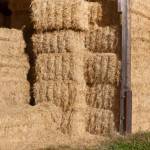Analyzing Horse Hay: Low in Zinc and Copper?

Whether it’s fresh grass in a meadow or high-quality baled hay, forage is one of the most natural and nutritious feedstuffs available for horses. The best forage contains many of the vitamins and minerals needed for health and vigor, but not all.
“Many horsemen take the time to have hay analyzed, and this speaks volumes for their commitment to the nutrition of their horses. Occasionally, test results reveal that hay is low in zinc, copper, sodium, and possibly other minerals,” said Catherine Whitehouse, M.S., a nutritionist for Kentucky Equine Research (KER).
“Depending on where the hay is grown, it might also be low in selenium. Because testing for selenium is expensive, some horsemen choose not to have hay analyzed for that macromineral. Similarly, because it is well known that vitamin content decreases significantly after hay is cut and stored, supplementation of vitamins is warranted.”
While it is tempting to buy separate mineral supplements—such as zinc and copper—to make up for the nutritional shortfalls in hay, caution should be employed as too much of one or the other may throw off the balance between the two minerals. The solution lies in something much simpler: a balancer pellet or a high-quality vitamin and mineral supplement.
“If horses absolutely cannot withstand the calories provided by a well-fortified feed—and many easy keepers cannot—a balancer pellet or vitamin and mineral supplement works wonders to provide essential nutrients,” said Whitehouse. “The nutrients are concentrated so these feedstuffs have low feeding rates, about 1-2 lb. (0.45-1 kg) for balancer pellets and mere ounces for vitamin and mineral supplements.”
The chief difference between the two products involves protein content, said Whitehouse. “The balancer pellet contains enough protein to fortify certain classes of horses beyond maintenance, including low-level performance horses and some breeding animals,” she explained, “whereas the supplement contains only vitamins and minerals, and no protein.”
Many feed stores carry a balancer pellet that would be appropriate for this scenario. In terms of a vitamin and mineral supplement, Micro-Max is available in the U.S. and in other areas of the world. Micro-Max contains high-quality sources of vitamins and minerals, and is suitable for all mature horses.
In Australia, All-Phase is appropriate for weanlings, yearlings, and older horses when fed according to the manufacturer’s recommendations. Also in Australia, well-formulated vitamin and mineral supplements include Gold Pellet and Nutrequin.
Finally, forage is low in sodium, so horses should have access to loose salt or a salt block and fresh, clean water at all times.
Do you have a specific question about equine nutrition? Ask a KER nutritionist today.








